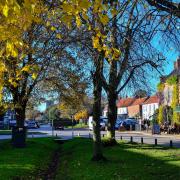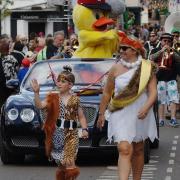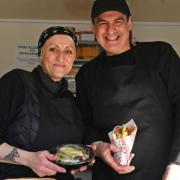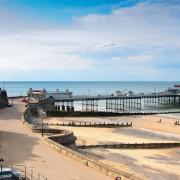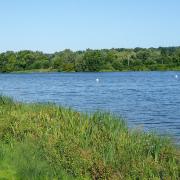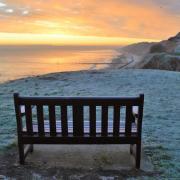Norfolk’s literary history stretches from medieval times right through to the present day – and the new National Centre for Writing should help keep it alive well into the future, writes Keiron Pim

WHEN THE National Centre for Writing opens it will only boost Norwich’s prominence as a gathering place for authors, poets and translators, consolidating the worldwide reputation of England’s first UNESCO City of Literature.
Built around Writers’ Centre Norwich’s (WCN) headquarters in the medieval Dragon Hall in King Street, the National Centre will combine living quarters for writers and translators in residence, a performance space for literary events, education areas for improving child and adult literacy, and an area where writers can meet and work.
Only £300,000 more is needed for WCN to meet its £2.65m target for the project, and it is hoped that this will be raised this year, enabling building work to begin next year ahead of a scheduled opening in early 2018.
The commitment to build such a venue was a fundamental aspect of the successful bid to UNESCO, which drew upon a literary history as long as that of the city itself. Ever since medieval times Norwich has been home to people who have tried to change the world through the written word, working from a place whose sense of separation often saw it unfairly labelled a backwater when in truth its residents were looking out across the sea to the wider world.
For Chris Gribble, chief executive of Writers’ Centre Norwich, Norfolk’s coastal position and consequent historic connections with northern Europe have much to do with the way it has fostered an outlook attractive to writers.
“I think Norfolk’s history and geography have led to a fascinating literary heritage that covers European literature, and work in translation because of that,” he says, adding that this combined fruitfully with the history of printing and publishing in Norwich.
“The fact that our city was the second largest in the country historically up until the 16th century has meant that literature played a key role in the local cultural ecology for hundreds and hundreds of years. It led to fantastically interesting writers of mixed cultural heritage, of international outlook, of diverse skills – and because of our geographical distance from London, it’s also been the place where individuals and schools and ways of looking at the world have thrived beyond the mainstream. It’s been a protective and protected space for writers and thinkers who have used books and publishing as a means of trying to alter the condition of the world.
“I’m thinking of everyone from Julian of Norwich through to the Martineaus and the campaigning figures of the current day, even Stephen Fry and his campaigns around mental illness and trying to change people’s views on that through his writing and television work. There’s a line through there and it’s something to do with our history and geography that makes the Norfolk legacy particularly strong.”
Anyone looking for the beginning of this thread might well locate it in Norwich more than 700 years ago, when a rabbi named Meir ben Eliahu wrote poems that recorded the suffering of city’s Jewish population, urging God to free them from the persecution that they faced before the expulsion of England’s Jews in 1290. Meir of Norwich’s Hebrew poems were published bilingually in 2013, translated by Norwich-based scholars Ellman Crasnow and Bente Elsworth, in an edition that I edited and introduced.
There followed in the 14th century Mother Julian’s Revelations of Divine Love, the first English-language book written by a woman, while in another amazing first, the Earl of Surrey Henry Howard (1517-1547) created the sonnet and blank verse, forms that were then taken up by Shakespeare.
To give only a few notable examples from Norfolk’s subsequent history as a home to influential writers, we could then mention Thomas Browne’s beautifully baroque and melancholic prose, which continues to beguile readers 400 years on from his birth and, in a very different field, Luke Hansard, who in the early 19th century established a printing business that made his name synonymous with the official written record of parliamentary debates. Thomas Paine, born in Thetford in 1737, helped change the history of the world with his pamphlet Common Sense, which inspired the fight for American independence. Chris Gribble mentioned the Martineau family; the “literary lioness” Harriet Martineau was a pioneering feminist and writer on social issues, upholding the county’s proud dissenting tradition by fighting against slavery and for human rights. “There is in Norwich a deaf girl who does more than any man in the country,” the Lord Chancellor Lord Brougham noted of her in 1830. Among her 19th century peers was the Great Yarmouth-born Anna Sewell, whose 1877 book Black Beauty – published by Jarrold and Sons – would go on to sell 50 million copies and help change attitudes towards animal welfare. The Dereham-born George Borrow recorded his travels around Norwich’s Mousehold Heath to Wales, Spain and beyond, writing a famous line in his book Lavengro that described Norwich well: “A fine old city, truly, is that, view it from whatever side you will.”
Latterly much of Norfolk’s literary fame has been connected with the University of East Anglia, where the Creative Writing MA programme has honed the talents of dozens of subsequently famous authors, and the arts faculties have housed many writers who combined academia with their own work. W G Sebald is widely held as one of 20th century Europe’s great writers and it was UEA that brought him to Norfolk, where he lived in Poringland writing beautiful, unsettling studies of displacement and loss until his death in 2001.
So the history feeding into the present push towards a National Centre for Writing spans many centuries during which our county has been, in the words of the UNESCO bid document’s author Magdalen Russell, “a place of ideas where the power of words has changed lives, promulgated parliamentary democracy, fomented revolution, fought for the abolition of slavery and transformed the literary arts”. Now it seems we’re set to begin an exciting new chapter in this long and compelling story.
Keiron Pim is an author & editor based in Norwich. His book Jumpin’ Jack Flash: David Litvinoff and the Rock’n’Roll Underworld (Jonathan Cape, £16.99) is out now.




